| |||||
| Decades: | |||||
|---|---|---|---|---|---|
| See also: | |||||
Events from the year 1919 in Czechoslovakia. The year saw the Treaty of Saint-Germain-en-Laye define the borders of the state and the Treaty of Versailles recognise its independence.
| |||||
| Decades: | |||||
|---|---|---|---|---|---|
| See also: | |||||
Events from the year 1919 in Czechoslovakia. The year saw the Treaty of Saint-Germain-en-Laye define the borders of the state and the Treaty of Versailles recognise its independence.

Czechoslovakia was a landlocked state in Central Europe, created in 1918, when it declared its independence from Austria-Hungary. In 1938, after the Munich Agreement, the Sudetenland became part of Nazi Germany, while the country lost further territories to Hungary and Poland. Between 1939 and 1945, the state ceased to exist, as Slovakia proclaimed its independence and Carpathian Ruthenia became part of Hungary, while in the remainder of the Czech Lands, the German Protectorate of Bohemia and Moravia was proclaimed. In 1939, after the outbreak of World War II, former Czechoslovak President Edvard Beneš formed a government-in-exile and sought recognition from the Allies.

Moravia is a historical region in the east of the Czech Republic and one of three historical Czech lands, with Bohemia and Czech Silesia.

Leoš Janáček was a Czech composer, musical theorist, folklorist, publicist, and teacher. He was inspired by Moravian and other Slavic music, including Eastern European folk music, to create an original, modern musical style.

Bohuslav Jan Martinů was a Czech composer of modern classical music. He wrote 6 symphonies, 15 operas, 14 ballet scores and a large body of orchestral, chamber, vocal and instrumental works. He became a violinist in the Czech Philharmonic Orchestra, and briefly studied under Czech composer and violinist Josef Suk. After leaving Czechoslovakia in 1923 for Paris, Martinů deliberately withdrew from the Romantic style in which he had been trained. During the 1920s he experimented with modern French stylistic developments, exemplified by his orchestral works Half-time and La Bagarre. He also adopted jazz idioms, for instance in his Kitchen Revue.
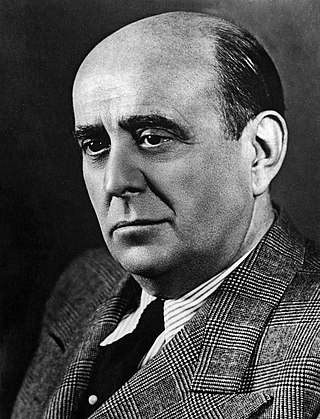
Jan Garrigue Masaryk was a Czech diplomat and politician who served as the Foreign Minister of Czechoslovakia from 1940 to 1948. American journalist John Gunther described Masaryk as "a brave, honest, turbulent, and impulsive man".

Karel Ančerl was a Czechoslovak conductor and composer, renowned especially for his performances of contemporary music and for his interpretations of music by Czech composers.
The First Czechoslovak Republic emerged from the collapse of the Austro-Hungarian Empire in October 1918. The new state consisted mostly of territories inhabited by Czechs and Slovaks, but also included areas containing majority populations of other nationalities, particularly Germans (22.95 %), who accounted for more citizens than the state's second state nation of the Slovaks, Hungarians (5.47 %) and Ruthenians (3.39 %). The new state comprised the total of Bohemia whose borders did not coincide with the language border between German and Czech. Despite initially developing effective representative institutions alongside a successful economy, the deteriorating international economic situation in the 1930s gave rise to growing ethnic tensions. The dispute between the Czech and German populations, fanned by the rise of Nazism in neighbouring Germany, resulted in the loss of territory under the terms of the Munich Agreement and subsequent events in the autumn of 1938, bringing about the end of the First Republic.
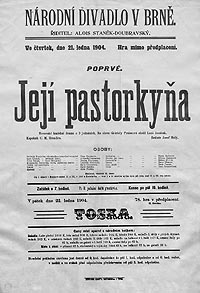
Její pastorkyňa ) is an opera in three acts by Leoš Janáček to a Czech libretto by the composer, based on the play Její pastorkyňa by Gabriela Preissová. It was first performed at the National Theatre, Brno on 21 January 1904. Composed between 1896 and 1902, it is among the first operas written in prose.
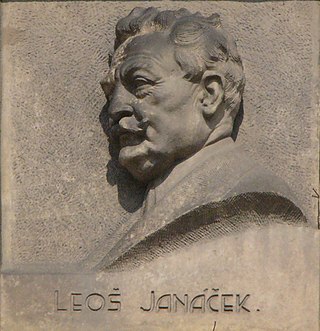
The Glagolitic Mass is a composition for soloists, double chorus, organ and orchestra by Leoš Janáček. The work was completed on 15 October 1926 and premiered by the Brno Arts Society, conducted by Jaroslav Kvapil, in Brno on 5 December 1927. Janáček revised the mass the next year.
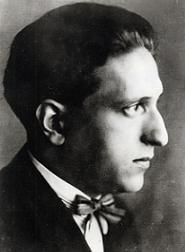
Pavel Haas was a Czech composer who was murdered during the Holocaust. He was an exponent of Leoš Janáček's school of composition, and also utilized elements of folk music and jazz. Although his output was not large, he is notable particularly for his song cycles and string quartets.
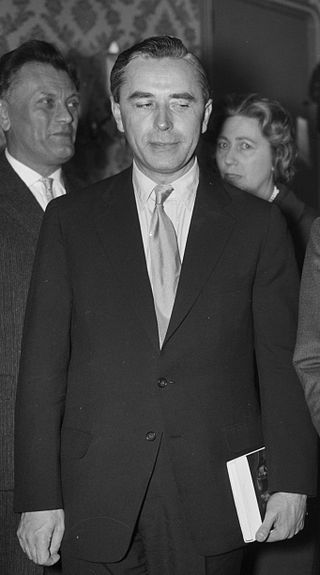
Rudolf Firkušný was a Moravian-born, Moravian-American classical pianist.

Supraphon Music Publishing is a Czech record label, oriented mainly towards publishing classical music and popular music, with an emphasis on Czech and Slovak composers.
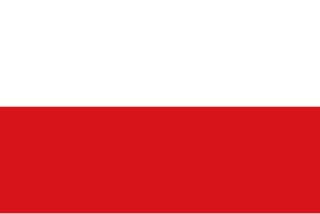
The First Czechoslovak Republic, often colloquially referred to as the First Republic, was the first Czechoslovak state that existed from 1918 to 1938, a union of ethnic Czechs and Slovaks. The country was commonly called Czechoslovakia, a compound of Czech and Slovak; which gradually became the most widely used name for its successor states. It was composed of former territories of Austria-Hungary, inheriting different systems of administration from the formerly Austrian and Hungarian territories.

The history of the Jews in the Czech lands, historically the Lands of the Bohemian Crown, including the modern Czech Republic, goes back many centuries. There is evidence that Jews have lived in Moravia and Bohemia since as early as the 10th century. Jewish communities flourished here specifically in the 16th and 17th centuries, and again in the late 19th and early 20th centuries. Local Jews were mostly murdered in the Holocaust, or exiled at various points. As of 2021, there were only about 2,300 Jews estimated to be living in the Czech Republic.
Ballad of Blaník, originally titled The Knights of Blaník, is a symphonic poem composed in 1920 by Leoš Janáček, based on a text by Jaroslav Vrchlický. It was Janáček's third symphonic poem. The piece is written in the key of A♭ minor. Its première was in Brno on 21 March 1920.
Events from the year 1918 in Czechoslovakia. The year was marked by the Czechoslovak declaration of independence and the Martin Declaration. The year also saw the election of the first President and Prime Minister of Czechoslovakia, Tomáš Masaryk and Karel Kramář respectively.
Events from the year 1920 in Czechoslovakia. The year saw the state adopt a new constitution and hold its first parliamentary elections.